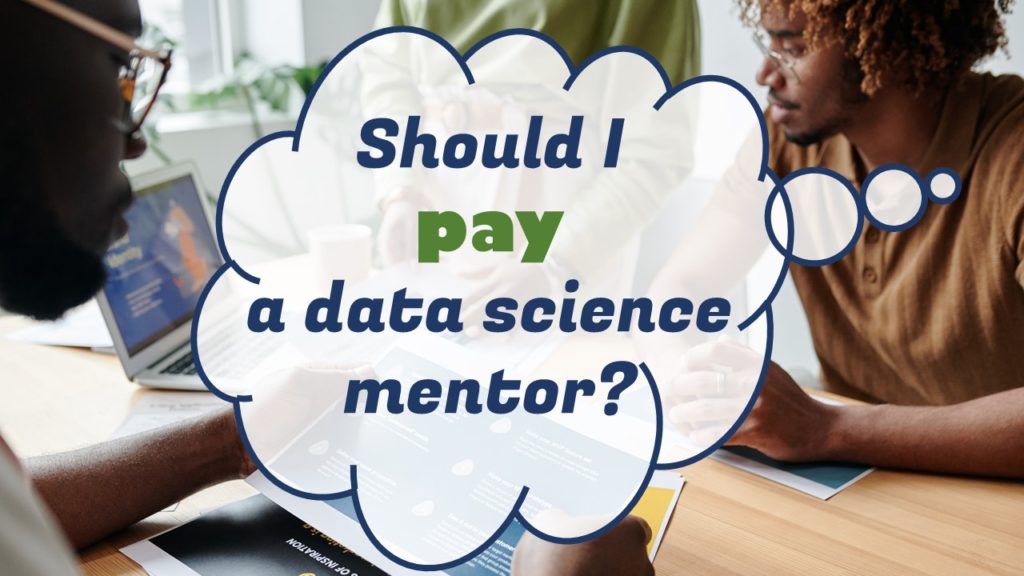Paid mentoring for data science is not a topic I see discussed a lot on social media or in academic forums. Most data science educators talk about online courses and portfolio projects – but what if you are struggling through those online courses, and not getting it? What if you try to do a portfolio project by yourself, and you just can’t figure it out? Then should you pay someone?
Paid mentoring for data science is usually not the first thought for the learner – but sometimes it is, depending on the learner’s background. I have many customers from the Middle East, where hiring a tutor during grade school is much more customary than where I grew up, in the United States (US). It is not unusual for my Middle Eastern data science customers to hire me to tutor them through a statistics class, and then follow-up and continue to hire me to mentor them to do projects in data science and actually publish them.
What is Wrong with Mentors Donating Their Time (Unpaid Mentors)?
Like I said, I don’t see a lot of discussion about paid mentoring for data science – or even unpaid mentoring for data science. However, mentoring is very central to the nursing field, and I work a lot with nurse educators and researchers, so unpaid vs. paid mentoring is discussed more often.
In nursing, the following problems have been identified with mentors who donate their time (unpaid mentors):
- Lack of mentoring skills. Mentoring is not that easy, and mentors need experience mentoring before offering to help others.
- Lack of time among good mentors. In nursing, word gets around as to who is a good mentor – but those people tend to be overworked. It’s not really fair to the mentors, or to the people trying to use them as mentors.
- Inappropriate attitude/reason for mentoring. Sometimes people volunteer to mentor you because they want you to fail, and they want to help you fail. After all, maybe you are competition. Other times, they want to brag that they are somehow a thought leader. People have all kinds of personal problems that lead to them wanting to offer free “mentoring” that they don’t know how to do.
Watch a rebroadcast of our livestream discussion on youtube!
Read the video description for the topics we covered, and links to more learning resources!
I have a friend who is a very good mentor of nurses. However, she does not charge money, and we discussed that she might need to start doing so. This is because there needs to be a way to separate the nurse trainees who are really going to value their time spent with her and those who won’t – since she has limited time to spend with mentees.
My friend doesn’t want to charge money to her mentees, because many nurse trainees don’t have a lot of money, but mentoring is required. However, if my friend continues to operate as a free mentor and not charge anything, she won’t be able to distinguish herself as a professional mentor, who is serious about her mentoring relationships.
And how can a trainee tell that that my friend is the kind of person who will actually help them, and keep their discussions with her private, rather than the kind of person who would use private information to backstab a colleague? An expectation of a level of professionalism is what you can get from a paid mentor.
Finding a Skilled Paid Data Science Mentor
I had mentored people before informally, but when I opened my business, I realized I had not really done any long-term mentoring. I also didn’t know how to run a business, so I got an unpaid business mentor. He wasn’t very helpful to me, because he really didn’t have more mentoring skills than I already did.
So the main issue I have with unpaid mentors is that they generally don’t have well-documented mentoring skills. If you are going to bother with the effort and time to develop a mentoring relationship, the selected mentor should have mentoring skills, and evidence of successful mentees. Paid mentors should be able to easily produce this evidence prior to you hiring them. Otherwise, the mentoring will not be worth the time.
That being said, it is hard to find people who even do this kind of work for pay. I did not even think to offer “mentoring” as a service when my business opened in 2012, because I didn’t know how to do it professionally. But I immediately began gaining mentoring skills, because after my tutoring customers graduated from college – especially my Middle Eastern customers – they kept turning into mentoring customers! So now, I have a lot of mentoring skills – and many successful mentees! At this point, I can produce the evidence I told you to look for in a potential paid mentor above.
But let’s say you don’t want me to be your paid mentor. How do you find another one? Well, like me, paid mentors often started out as unpaid ones, or people who were just being generous and helpful in their spare time. These people often did services like I do – coaching, teaching, or developing curricula – before getting into paid mentoring. Here is what I suggest you do to look for a paid data science mentor who is a good fit for you:
Consider high-profile online data science educators.
I’m a LinkedIn Learning author, for example. You will also see others posting online courses and videos in data science. These people often offer paid mentoring – and it might not be as expensive as you think. As you consume their teachings online, consider how they will “fit” you in terms of their teaching style, what they know, and experiences in data science they have had.
Looking for people in academia and industry is NOT a good idea, IMHO.
This is regardless of whether you offer pay or not. I will tell you why from my experience. First, people in academia (professors, statisticians on research grants, and so on) are usually untenably busy – like, overworked and underpaid – and are also mired in office politics. Because of this, they cannot spend time with you very often, and when they do, they are often burned-out, self-focused, and are unable to talk freely about their work. Similarly, people hired in an industry are often so caught up in their day-to-day work that the aren’t focused on the mentee (imagine a data analyst at a biotech startup). So while it might sound like a good idea to be mentored by someone working at a place where you might want to work someday, I have found that that logic usually doesn’t work out.
If you find a high-profile data science educator you might want mentoring from, contact them and ask if they offer it.
Explain what you are looking for – like, why you selected them to contact, and what you thought they might be able to provide you. Even if they do not offer mentoring, they will likely know people who do – and then they can help connect you with someone. If they aren’t very helpful to you, then you prevented yourself from wasting money on them!
Make sure you document shared expectations before you start mentoring.
Almost all of my mentoring customers started as tutoring customers, so our relationship was already established. My new customers, however, are more likely to be data scientists and other professionals who are trying to improve their career, undergo development, and get promoted. Before we start our mentoring relationship, I spend a considerable amount of unpaid time meeting with them on Skype to get to know what their goals are for the mentoring, what their timeline is, and what their budget is. We make a full plan before we start the mentoring relationship, and any paid mentor should be willing to do this with you prior to starting services.
What Are Reasonable Expectations for Paid Mentoring for Data Science?
Here, I’m going to describe what I think you should reasonably expect from a paid mentoring relationship in data science – and what you will get from me if we work together.
Budgeting/Payment
Most mentors have an hourly fee, which they set depending upon the customer. For individual customers, my fee is around $100/hour. For businesses who buy mentoring in bulk, I use this fee as an estimate when coming up with a contract with the business for educational services.
Hourly approach: When I have mentees who get a new job and want me to mentor them through getting established in it, we establish weekly or biweekly Skype meetings for 1-2 hours (depending upon their schedule). So, if you are meeting with me twice in a month for two 2-hour meetings (a total of 4 hours), you can budget $400/month for mentoring.
If you work at a workplace that wants to support your training and development, you could ask them if you were allowed to get reimbursement. That would be a total of $4,800 per year, and I have seen businesses easily pay this amount for boring on-site trainings that don’t do anything for your career.
Project approach: I once had a tutoring customer who graduated and suddenly came to me when applying for a job. She wanted to have me help her finish a peer-reviewed article she was working on ASAP. That way, she could submit it to a journal ASAP, and she could honestly tell the job in her application that she had submitted this paper to a journal. She told me she was hesitant to contact me since she didn’t have any money (obviously, she was looking for a job!).
Normally, I would have offered her my $4,000 deal – but I reduced the price by some amount, because she already had some skills so I could get her to do some of the work I would normally do on the project, and also, she really didn’t have any money. Then I told her I would make a payment plan for her, where she could pay an agreed-upon amount per month until it was paid off.
This turned out to be an ideal plan. We got the paper done and submitted, the job was impressed and hired her, and she paid me off several months later.
Process
As I said, prior to starting the mentoring relationship, you should meet with the mentor and decide what the mentoring goals and timeline are. Even when I have regular meetings with mentees, and we are not working in a project-based way, we usually have long-term goals we are working on (e.g., tenure packet, independent project). It is important that these are established so that as a customer, you can look back after a few months and ask yourself: Is this relationship working for me?
- Ongoing relationship: If you have an ongoing mentoring relationship, then the goals and timeline should be laid out in writing. That way, each time you meet, the mentor can revisit these long-term plans and make sure you are making steps together to get toward these goals.
- Project-based: When I set up project-based mentoring (as I did with the customer with the peer-reviewed paper request), we also set up meetings as with the ongoing relationship. The meetings are set up according to a project timeline, however, since we are usually in a hurry. So with project-based mentoring, from the beginning to the end of the project, you will see that certain meetings and deliverables are already scheduled. This should make you feel comfortable – that you are on the same page with the mentor about the work you have to get done.
Mentoring in Data Science can be the “Special Sauce” to Successful Skill Application
There are two main reasons why I wrote this blog post. First, I want to get more mentoring customers in data science, because I really enjoy those relationships – especially the ones where we meet weekly or biweekly. I love helping the individual grow and flourish in their data science positions through the acquisition of higher-level management, communication, and other professional skills. These relationships often last years. This is the kind of teaching you literally cannot do in a college classroom, and it is really fun for me, because it is like helping a small sapling grow into a large, healthy tree.
The second reason I wrote this is that I’m getting a lot of inquiries on LinkedIn and in other venues about “how to apply data science skills”. I think a lot of people have been fooled into thinking you can take online courses, and then you are a data scientist and can get a job somewhere. I just watched part of this video by data scientist Ken Jee, where he talked about how LinkedIn has a new multiple-choice “machine learning assessment”. Ken accurately documents its lameness, and so LinkedIn is not helping any by forwarding this kind of thinking.
Unfortunately, you really can’t get data science application skills without doing projects, and you are either doing them on your own (at school, or in your personal life), or you are doing them at work on-the-job – where you will get in trouble if they are done wrong! That’s really the “special sauce” of paid data science mentors like me. I can help you encounter these skills-application challenges in real-time, while you are on the job. Not only does this give me the unique opportunity to share my skills with you in that particular context, but also, it helps you consistently approach your work so that you bring solutions to the table, and you stand above your colleagues. All my mentees are “rock stars” at work – and you can be one, too!
Updated January 5, 2022. Added video January 13, 2022. Added mentoring program September 24, 2022. Added services slider October 7, 2023.
Learn about our different free and paid services!
Paid mentoring for data science can be worth the cost in certain circumstances – but not others. My blog post provides guidance on hiring a paid mentor.




